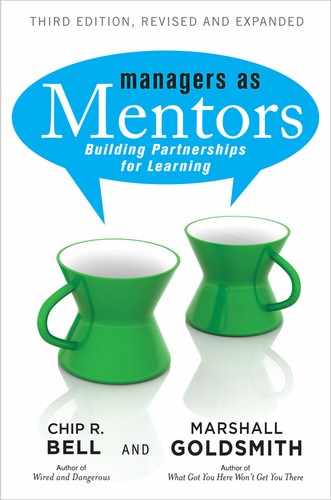The Power of Feedforward
Providing feedback has long been considered an essential skill for mentors. But there is a fundamental problem with all types of feedback: it focuses on the past, on what has already occurred—not on the infinite variety of opportunities that can happen in the future. As such, feedback can be limited and static, as opposed to expansive and dynamic.
Over the past several years, I have observed more than thirty thousand leaders as they participated in a fascinating experiential exercise. In the exercise, participants are each asked to play two roles. In one role, they are asked to provide feedforward—that is, to give someone else suggestions for the future and help as much as they can. In the second role, they are asked to accept feedforward—that is, to listen to the suggestions for the future and learn as much as they can. The exercise typically lasts for ten to fifteen minutes, and the average participant has six to seven dialogue sessions. In the exercise participants are asked to:
• Pick one behavior that they would like to change. Changing this behavior should make a significant, positive difference in their lives.
• Describe this behavior to randomly selected fellow participants. This is done in one-on-one dialogues. It can be done quite simply, such as, “I want to be a better listener.”
• Ask for feedforward—for two suggestions for the future that might help them achieve a positive change in their selected behavior. If participants have worked together in the past, they are not allowed to give ANY feedback about the past. They are only allowed to give ideas for the future.
• Listen attentively to the suggestions and take notes. Participants are not allowed to comment on the suggestions in any way. They are not allowed to critique the suggestions or even to make positive judgmental statements, such as, “That’s a good idea.”
• Thank the other participants for their suggestions.
• Ask the other persons what they would like to change.
• Provide feedforward—two suggestions aimed at helping the other person change.
• Say, “You are welcome” when thanked for the suggestions. The entire process of both giving and receiving feedforward usually takes about two minutes.
• Find another participant and keep repeating the process until the exercise is stopped.
When the exercise is finished, Marshall asks participants to provide one word that best describes their reaction to this experience. He asks them to complete the sentence “This exercise was …” The words provided are almost always extremely positive, such as “great,” “energizing,” “useful,” or “helpful.” One of the most commonly mentioned words is “fun!”
What is the last word that comes to mind when we consider any feedback activity? Fun!
